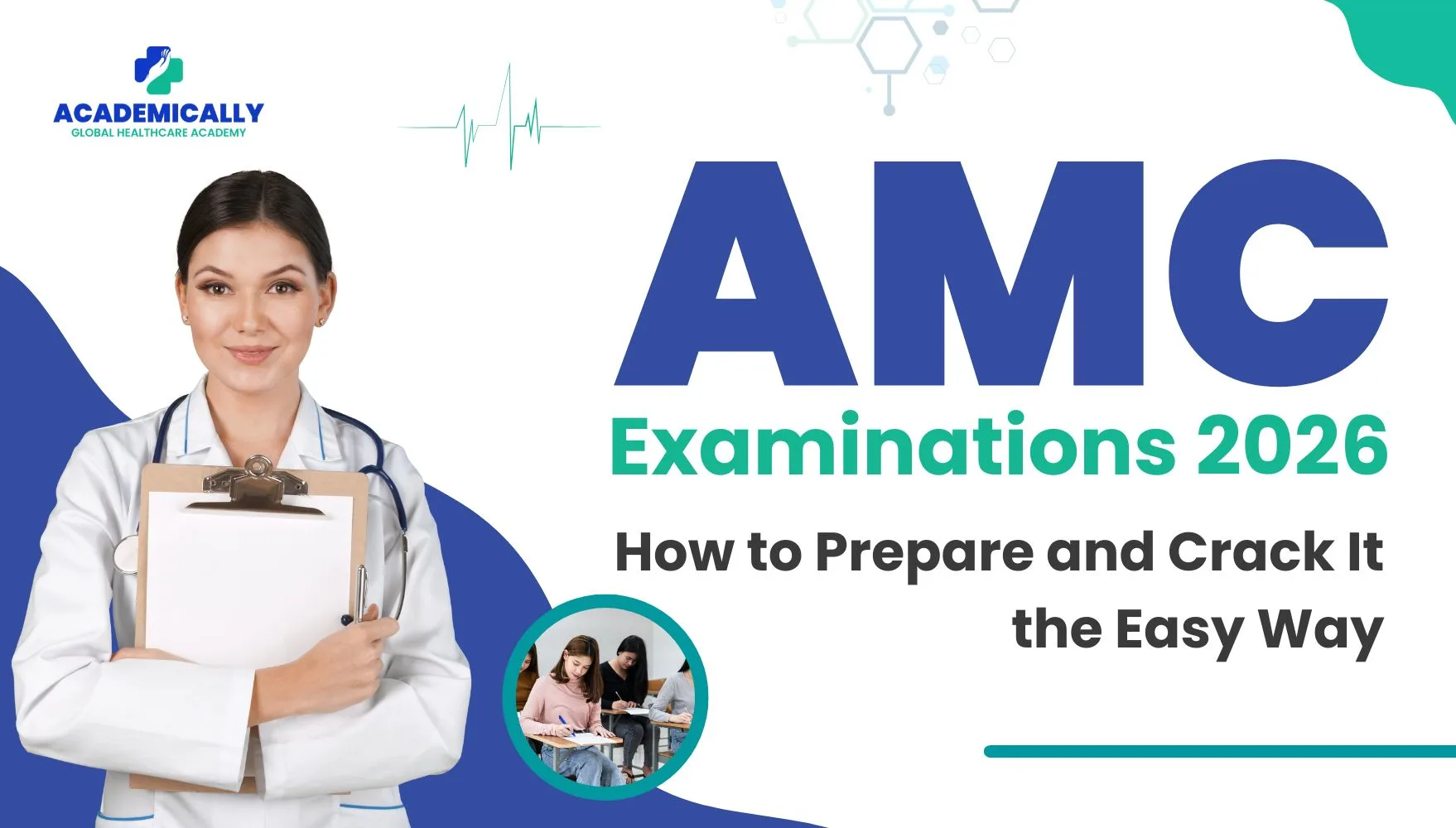So, you’ve decided to take the AMC Examination and pursue your dream of practising medicine in Australia? That’s a big and exciting step! The Australian Medical Council (AMC) exams are your gateway to working as a doctor down under. But yes, the journey can feel overwhelming, especially with so much to study and so many myths floating around.
Don’t worry. This guide will help you understand what the AMC exams are, how to prepare smartly, and how to crack them the easy way (well, easier way!). Let’s dive in.
What Is the AMC Examination?
The AMC Examination is designed to assess the knowledge and clinical skills of international medical graduates (IMGs) who wish to work in Australia. It ensures that your medical knowledge matches that of Australian medical graduates.
There are two main parts:
- AMC MCQ – This is a multiple-choice question exam that tests your clinical knowledge.
- AMC Clinical Examination – This is a practical exam that tests how well you can apply that knowledge in real-life scenarios with patients.
You’ll need to clear the MCQ exam first before you can attempt the clinical exam.
Why You Shouldn’t Panic About AMC 2026
Many candidates get stressed when they hear about the AMC exams. Yes, they’re challenging, but they’re absolutely doable if you plan well and prepare smartly.
The good news? The AMC 2026 exam pattern is not expected to change, and the content outline remains the same: it’s all about testing your clinical reasoning, diagnosis, and management skills.
Think of it this way: the AMC exam doesn’t want you to memorise textbooks. It wants to know whether you can think like a doctor in Australia, using evidence-based, patient-centred reasoning.
Understanding the AMC MCQ Exam
Let’s start with the first step, the AMC MCQ Examination.
- Format: 150 multiple-choice questions (MCQs)
- Duration: 3.5 hours
- Type: Computer Adaptive Test (CAT)
- Qualifying Score: 250, which is 50%
The MCQs are not about remembering rare diseases or minute details. Instead, they test your ability to reason through clinical cases.

AMC Clinical Exam Overview
Once you pass the MCQ, you can move on to the Clinical Exam.
This part tests your communication, empathy, and practical medical skills.
- Format: 16 stations and 4 rest stations
- At each station, you will get 10 minutes, which contains 2 minutes of reading time and 8 minutes of assessment time.
How to Prepare Smartly for AMC 2026
Now, let’s talk about the real deal,how to prepare and crack it easily.
Here’s a step-by-step roadmap:
Step 1: Understand the Blueprint
Before you start your AMC preparation, take time to go through the official AMC MCQ syllabus. It’s the key to understanding what topics are tested, how they’re distributed, and the depth of knowledge expected in each area.
The syllabus acts as your clear roadmap it helps you prioritize important subjects and avoid wasting time on content that won’t be assessed. By aligning your study plan with the AMC syllabus from day one, you’ll build a focused, efficient strategy that actually leads to results.
Enrol in a good AMC preparation course that follows the syllabus closely and helps you stay on track with expert guidance.
Step 2: Make a Study Plan
You don’t need to study 12 hours a day. What you need is consistency.
Here’s a simple 6-month plan you can tweak based on your schedule:
- Months 1–2: Cover core subjects
- Month 3: Focus on subjects that are of less weightage
- Months 4–5: Practice question banks and AI mock tests
- Month 6: Revise high-yield topics and work on weak areas
Try to study 4–6 hours a day and take one day off each week.
Remember: smart study > long study.
Step 3: Practice with Question Banks
MCQ practice is your best teacher.
The AMC exam is all about pattern recognition and logic, and question banks help you master that.
Start early and practice questions a lot before the exam. After each question, review the explanations carefully, even for the ones you got right.
Step 4: Join Study Groups
Preparing alone can be hard.
Join Telegram channels, or online forums where other AMC aspirants discuss doubts and share resources.
Group discussions help you:
- Stay motivated
- Learn faster
- Discover new materials
Just remember not to compare your progress with others. Everyone learns differently.
Step 5: Simulate Exam Conditions
At least 2–3 weeks before the real exam, start doing mock exams under timed conditions.
This helps you build stamina and reduces exam-day anxiety.
For the clinical part, practice mock OSCEs with friends or mentors. Record yourself to assess your tone, empathy, and structure.
Common Mistakes to Avoid
Here are some traps many candidates fall into:
- Cramming theory instead of clinical reasoning
- Skipping mock tests (“I’ll do it later” – big mistake)
- Neglecting ethics and communication
- Not understanding Australian guidelines
- Rushing into the clinical exam before being ready
Remember, the AMC exam is about thinking like an Australian doctor, not just recalling facts.
Exam Day Tips
When the big day arrives, keep these things in mind:
For the MCQ Exam:
- Get a good night’s sleep.
- Read each question carefully, don’t rush.
- Eliminate obviously wrong options first.
- Trust your preparation and instincts.
For the Clinical Exam:
- Smile, greet, and show empathy.
- Follow a structure: History → Exam → Diagnosis → Management.
- Even if you don’t know the exact answer, show safe reasoning.
- Stay calm and confident.
Life After the AMC Exam
Once you clear both exams, congratulations, you’ve done the hard part!
You’ll then receive an AMC Certificate, which allows you to apply for medical registration in Australia.
From there, you can start your internship or supervised practice and eventually gain full registration with the Medical Board of Australia.
It’s a long journey, but thousands of IMGs make it every year, and so can you.
Final Thoughts: Crack It the Easy Way
There’s no “magic shortcut,” but there is an easier way:
- Study smart, not endlessly.
- Focus on clinical reasoning.
- Practice, revise, and stay positive.
The AMC exam isn’t meant to stop you; it’s meant to ensure you can provide safe and competent care to patients in Australia.
With the right mindset and preparation, you can absolutely pass it in 2026.
So, take a deep breath, make your plan, and start today.
Your Australian medical dream is closer than you think!





